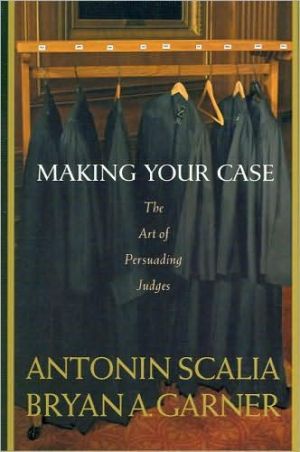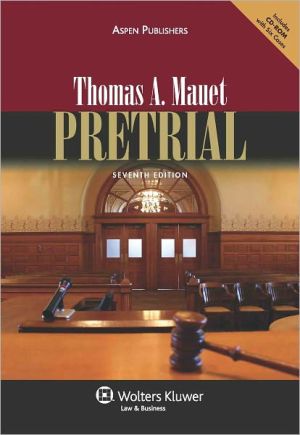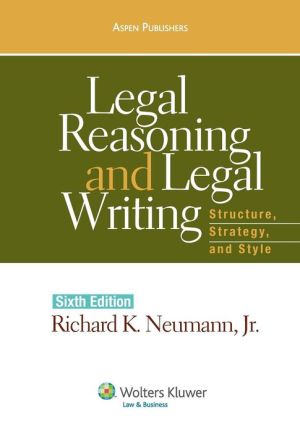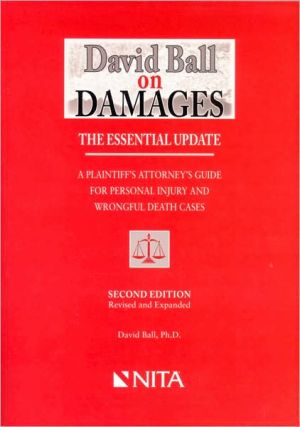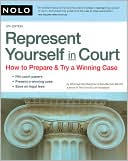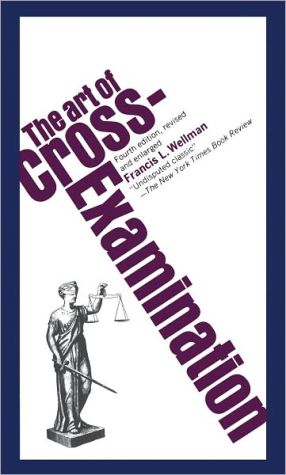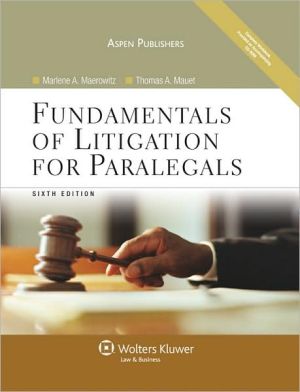Nolo's Deposition Handbook
Take the mystery out of your deposition with this comprehensive guide. Getting deposed? Here's the book you need. Nolo's Deposition Handbook is for anyone who will conduct a deposition or will be deposed; providing all the information, tips and instructions you need whether or not you're represented by a lawyer. Packed with concrete suggestions and examples, the book explains how to arrange a convenient date, prepare for the deposition, respond to questions with aplomb and ask the right...
Search in google:
Take the mystery out of your deposition with this comprehensive guide.Getting deposed? Here's the book you need.Nolo's Deposition Handbook is for anyone who will conduct a deposition or will be deposed; providing all the information, tips and instructions you need whether or not you're represented by a lawyer. Packed with concrete suggestions and examples, the book explains how to:arrange a convenient date prepare for the deposition respond to questions with aplomb ask the right questions You'll even learn the three "golden rules" for answering questions and the trick questions lawyers often use to influence testimony.Written by two UCLA law professors and attorneys, Nolo's Deposition Handbook provides all the information you need to sail through the deposition process with confidence.A perfect book for law students, lawyers, legal assistants, witnesses, expert witnesses and people who represent themselves in court.The 5th edition contains updated statutes, cases and rules, plus new material on "electronic discovery", which applies to information stored in computers, including records and emails. New Orleans Times-Picayune "Nolo publications are known for their clarity and reader friendliness. -- "
Introduction\ This chapter offers suggestions to help you prepare for being deposed (having your deposition taken). Although preparation for anyone being deposed is similar, this chapter's suggestions differ somewhat depending on whether you are:\ \ a party represented by a lawyer\ a party representing yourself, or\ a nonparty witness.\ \ \ \ Although you may benefit from reading the entire chapter, if you are pressed for time, concentrate on the section that applies to your situation.\ Parties Represented by Attorneys\ If you are a plaintiff or defendant who is represented by an attorney, you may use any or all of the preparation methods suggested in the sections below. However, because attorneys sometimes follow idiosyncratic practices when it comes to deposition preparation (and some may even disagree with one or more of the suggestions here), consult with your lawyer before beginning to prepare seriously. Then, together, you and your attorney can work out a joint\ strategy. (If you are a nonparty witness who will be represented by an attorney at your deposition, like a party, you too should discuss how to prepare for your deposition with the attorney.)\ The following subsections address a few subjects that parties should be familiar with even if they are represented by an attorney. Just as educated consumers often get the best deals, educated clients often get the best level of service from their lawyers.\ Do Not Discuss the Deposition With Your Opponent\ Never discuss your deposition with the opposing party or the party's lawyer. Instead, convey every communication and request, even one as simple aschanging the deposition's date or starting time, through your attorney. Especially if your opponent is also represented by a lawyer, contacting the other party personally can be risky. Even a courteous request may be\ misinterpreted as an attempt to intimidate the party or evade the rules. And if you end up talking about the case, you may unwittingly provide your adversary with additional evidence to use against you. (To encourage parties to settle disputes, evidence rules generally forbid parties from mentioning settlement negotiations or offers and counteroffers at trial. (See\ Federal Rule of Evidence 408.) However, to avoid any misunderstanding about whether a predeposition conversation you had was a settlement discussion, leave the communications to your attorney.)\ Meeting Before the Deposition\ If you are to testify completely and accurately at your deposition, you'll undoubtedly need to prepare in advance. As a general rule, therefore, expect your attorney to request to meet with you prior to the date of your deposition. Deposition preparation sessions are legitimate and routine: If you're asked at deposition whether you met with your attorney before the deposition to go over your testimony, you can answer "yes" forthrightly. (See "Responding to Common Questions" in Chapter 4 for more on how to answer this question.)\ At the predeposition meeting, the attorney will probably explain what will happen at the deposition, review important documents that you may be asked about, and discuss general strategies as to how you should respond to deposition questions. Many attorneys like to conduct a short "mock" (practice) deposition so that you can practice answering the types of\ questions you're likely to be asked at the deposition. During the practice session, your attorney's questions will probably focus on the details of important events.\ Your attorney may suggest holding the predeposition meeting only a day or two prior to the deposition. This gives the attorney maximum time to review the file and be up to speed on the issues and the kinds of questions you're likely to be asked. However, your peace of mind should also be a relevant factor. If you're feeling anxious about being deposed, you might ask to meet\ with your attorney well in advance of the deposition. At this earlier time, the attorney should be able to review the deposition process with you as well as address and hopefully assuage any concerns that are making you anxious.\ Responding to Requests for Documents\ The Notice of Deposition may ask you to bring various documents along to the deposition. If so, review the notice with your attorney. Your attorney may want to refuse the request (at least in part) on the ground that one or more of the sought-after documents is "privileged" (shielded from disclosure). (See Chapter 7.)\ Or, the notice may be so broad or vague that you'll need your lawyer's help to know what to bring. For instance, after reading a notice that asks you to bring "all records and memoranda" pertaining to a particular transaction, you may be unsure as to whether an email message obliquely referring to the transaction should be included. If you neglect to bring a document that the deposing party asks -- and is entitled -- to see, you may have to\ return with the documents for additional deposition testimony. By checking with your attorney, you can avoid either unnecessarily prolonging your deposition or unwittingly revealing documents the opposing party shouldn't see.\ Reviewing Documents\ Regardless of whether a particular document is one that you have been asked to produce at the deposition, it is important that you not read or review any documents in preparation for your deposition until you consult with your attorney. That's because one of the first questions you're likely to be asked at deposition is the following:\ Q: Prior to appearing for this deposition, did you review any documents in preparation for the deposition?\ If you answer "yes," you will probably then immediately be asked to identify all the documents you looked at. Those documents would include electronically stored information such as email messages and computer files. Your adversary may then demand to see all these documents. Since deposition rules normally require you to turn over to the opposing party for\ examination any documents you use to "refresh your recollection" in preparation for a deposition, this demand is usually proper. In fact, in some states you can even be forced to turn over a document that would otherwise be privileged and thus shielded from disclosure! To avoid having to turn over a document that your adversary may not otherwise have known even existed, you should not review documents before talking to your lawyer.\ Parties Representing Themselves\ If you are representing yourself in a lawsuit, quite possibly the first thing you'll need to\ do after receiving a Notice of Deposition is to calm down. Check the time, date, and location of the deposition. Remember that depositions are a common feature of civil litigation; that you have been called for a deposition should be seen as neither unusual nor particularly scary.\ However, because what you say at the deposition (and how you say it) can significantly influence whether your opponent decides to go all the way to a trial, as well as the terms of any settlement offer the other party might make, good preparation is essential. The next sections present some suggestions designed to help you present accurate and credible deposition testimony.\ Gathering Requested Documents\ Review the Notice of Deposition to determine whether you are required to bring specified documents with you to the deposition. Below are issues to consider when deciding how to respond to a document request.\ Is the Document Request Proper Under the Discovery Rules?\ FRCP 26(b)(2) provides that a document request is improper when its "burden or expense ... outweighs its likely benefit, taking into account the needs of the case, the amount in controversy, the parties' resources, the importance of the issues ... and the importance of the proposed discovery in resolving the issues." Typical examples of document requests that may be improper under this rule include:\ \ a request that is too vague for you to figure out what you're supposed to bring (for example, "produce all records bearing on important accounts")\ a request that is so broad that you would have to fill a 16 in order to comply (for example, "produce all employee records for the past ten years"), or\ a request that seeks hard-to-find documents that you believe have no relevance to the dispute (for example, "produce the last telephone bill you received before installing the new phone system eight years ago").\ \ \ \ In all of these situations, FRCP 26(b)(2) probably makes the requests improper. Your initial response should be to contact the deposing party and try to resolve the problem. For instance, if the problem is that the request is too vague, ask the deposing party to specify which\ documents you are to produce or to narrow the request to a particular period of time. If you and the deposing party agree on what documents you are to bring, it's best to put your understanding in writing in the form of a letter.\ [Sample Letter Confirming Agreement on Document Request] omitted for online sample chapter.\ If you cannot resolve the problem informally, you should bring to your deposition only those documents that you can identify as reasonably related to the case and called for by the document request. For example, if you think that the request to produce "all employee records for the past ten years" is too broad and burdensome, you might bring the records for the past two years if that is the period of time that seems reasonably related to the dispute.\ When you're asked at the deposition which documents you've brought, you should respond by identifying what you've brought and explaining why you haven't brought every conceivable document. For example, if you were asked to bring "all records pertaining to important accounts," you might say something like,\ "I brought the records for the Hatfield and McCoy accounts. Those are the only ones I brought, because they are the only ones that seem related to this case, and I didn't really know what you meant by 'important accounts' because we have over 500 accounts in the office."\ If your adversary's lawyer wants additional records, you might try again to reach an agreement at the deposition. If you cannot reach an agreement, your adversary will have to go to court and seek an order requiring you to produce additional documents. At the court hearing, you can justify your response by pointing out the vague wording of the document request and\ why additional documents would have no bearing on the case.\ Are Requested Documents in Your "Possession or Control"?\ When complying with a request for documents, you need gather and bring with you to the deposition only those documents that are in your "possession or control." Your adversary cannot force you to obtain documents that are in the possession of someone who is outside your control. At the same time, it is not legally proper for you to give documents away to other people simply to avoid having to comply with a request in a Notice of Deposition.\ Example 1\ \ A Notice of Deposition asks you, the owner or manager of a business, to bring a certain written contract to your deposition. The contract is in the office of your assistant manager in a different city. You would have to bring the contract to the deposition. It may not be in your physical possession, but it is under your control because the assistant manager works for you and your company.\ \ \ Example 2\ \ Again, a Notice of Deposition asks you to bring a certain written contract to your deposition. After receiving the notice, you remove the contract from a file in your office and give it to a friend or relative. Because you voluntarily gave up possession of the contract after you were given notice to produce it at your deposition, the contract remains in your "possession or control" and you would have to produce it at the deposition. (Lawyers would say you have "constructive possession.")\ If you don't produce it, the deposing party will surely ask for its whereabouts. You will\ either have to reveal that you gave it away after receiving the notice to produce it or lie about what happened under oath. Assuming that you tell the truth, you'll have to produce the document anyway. If you're discovered to have lied, you severely damage your credibility and expose yourself to criminal prosecution for perjury.\ Example 3\ \ Again, a Notice of Deposition asks you to bring a certain written contract to your deposition.\ However, the contract was one of a number of documents that you transferred to another company when you sold part of your business. You would not have to produce the contract at your deposition, as it is no longer in your possession or control.\ \ \ Are Requested Documents Privileged?\ You also need not and should not turn over to your adversary any documents that are privileged (shielded from disclosure). Examples of documents that may be privileged include the following:\ \ Written communications to or from your lawyer. For example, a letter or email message written by you to a lawyer seeking legal representation or an opinion about the merits of your\ case would be privileged.\ \ \ Written communications between you and your spouse. For example, an email message that you send to your spouse describing some aspect of the case would be privileged.\ \ \ \ \ See Chapter 7 for a fuller explanation of privileges. Other documents that may be privileged include a letter from your doctor discussing your physical condition, a document that contains confidential business information known as a "trade secret" (such as your company's confidential list of prospective customers), or even a document that might implicate you in criminal activity. Whether documents can be withheld as privileged often depends on the information contained in a document and the legal and factual issues involved in the lawsuit.\ Whenever possible, seek legal advice if you think that a possibly important document you do not want to reveal may be legitimately withheld as privileged. If you decide not to seek advice from a lawyer and are still uncertain as to whether the information in question is privileged, you can address the issue at the deposition itself. Tell your opponent's lawyer on the record (taken down by the court reporter after you've been sworn in) which documents you have not produced because you think they are privileged -- without revealing too much of their contents. You and the lawyer may then be able to work out an acceptable compromise.\ Be careful not to reveal privileged\ information. If you voluntarily reveal privileged information, a court might find that you have "waived the privilege" (given up your right to keep the communications confidential). For example, if, in the course of describing a document you withheld because\ you think it is privileged, you go into such great detail that you reveal the contents of the document, you might have to hand over that document. Err on the side of less detail. It's better to say "I didn't produce correspondence from my lawyer" than "I didn't produce a letter in which my lawyer told me that he thinks I will make a bad witness and will have trouble proving that I have been injured."\ \ Example\ \ You are suing someone for personal injuries they caused you in an auto accident. You get a Notice of Deposition that requires you to produce "all documents that mention or refer to the injuries you claim you suffered as a result of the accident." (These documents would not be privileged, because when you make a legal claim for personal injuries, you waive [give up] the doctor-patient privilege for written and oral communications between you and your physician relating to those injuries.)\ On your computer, you have a copy of a letter you sent to the doctor who is treating you for the injuries caused by the accident. In that letter, you briefly refer to the injuries caused by the accident, and then discuss in detail another personal medical problem completely unrelated to the injuries you sustained in the accident. You have decided not to produce the letter because it contains personal information about a medical condition that has nothing to do with the lawsuit, and you assert the doctor-patient privilege as a basis for withholding the letter. At your deposition, the following exchange takes place:\ Q: (Adversary's lawyer): Have you brought with you today all the documents I requested\ in the Notice of Deposition?\ A: (You): With one exception. I have a copy of all the documents that you asked for\ right here. But there is one document that I am not producing because I believe it is privileged.\ Q: And what document is that?\ A: It's a letter I sent to the doctor who's been treating me for injuries I suffered in the accident.\ Q: Why do you think it is privileged?\ A: Because it's a letter I sent to my doctor and it's mostly about a personal medical\ problem I have that has nothing to do with the auto accident.\ Q: You say this letter is mostly about an unrelated personal medical problem. Does the\ letter say anything about the injuries you sustained in the accident?\ A: Yes, it mentions them just very briefly.\ Q: All right, let me suggest how we might proceed. Use my copy machine and make a copy of the portion of the letter that refers to the injuries you claim to have sustained in the accident. You don't have to copy the rest of the letter. Or if you prefer, you can read to me the portion of the letter that refers to your injuries. But before you do either of those, I want to tell you that I am reserving the right to go to court later in the case to ask the judge to order you to produce the entire letter if I think I need to see it. Can you copy the letter and cover up the portion referring to your medical problem that is unrelated to the accident?\ A: Yes. I can do that. That sounds fair to me.\ \ By voluntarily indicating to your opponent that you are withholding a document because you believe it is privileged, you demonstrate to the lawyer (and later to a judge, if necessary) that you are not trying to hide relevant documents. If you are up front about your reasons for withholding documents, you can probably work out solutions with the adversary's lawyer.
Introduction: Your Deposition CompanionPart One: Being DeposedPart Two: Taking and Defending DepositionsThe Federal Rules of Civil Procedure (FRCP)Finding the Deposition Rules That Apply to YouLocal RulesPart One1. An Overview of Deposition ProceduresDepositions in a NutshellProviding Notice of a DepositionDeposition Scheduling RequirementsRescheduling Your DepositionAvoiding a Deposition AltogetherDuration of DepositionsDeposition AttendeesDocument Production at DepositionsReviewing and Signing Your Deposition2. Using Depositions in a LawsuitUsing Depositions Before a TrialUsing Depositions in a Trial3. Preparing to Give Deposition TestimonyParties Represented by AttorneysParties Representing ThemselvesNonparty Witnesses4. Responding to QuestionsThe Golden Rules for Responding to QuestionsResponding to Common QuestionsResponding to Trick QuestionsResponding to Requests for Future ActionFinishing Interrupted AnswersHandling FatigueObjectionsReviewing and Signing Your Deposition5. Beginning a Deposition: "The Usual Admonitions"Admonitions DefinedPurposes of AdmonitionsAdmonitions: Examples and Explanations6. Background QuestionsHidden AgendasLegitimacy of Background QuestionsYour Employment HistoryYour Educational BackgroundOther Background Topics7. Questions You Can Legally Refuse to AnswerPrivileged CommunicationsThe Work Product PrivilegeEvidence of Criminal ActivityPrivate Information8. Expert Witness DeponentsThe Difference Between Expert and Nonexpert WitnessesPredepositionDisclosuresTypical Predeposition InvolvementThe Importance of Thorough Deposition PreparationThe Predeposition Planning MeetingTypical Deposition QuestioningPart Two9. The Lay of the Discovery LandscapeThe Purposes of DiscoveryImpediments to Achieving Discovery GoalsVoluntary DisclosureInformal DiscoveryDiscovery PlansGeneral Rules of Discovery QuestioningEnforcing Discovery RulesAn Overview of Formal Discovery Methods10. Defending a DepositionPreparing for the DepositionListening CarefullyEliciting Additional Information After Your Opponent's QuestioningEntering Into StipulationsMaking ObjectionsTerminating a Deposition11. Taking a Deposition: Deposing a "Hostile" WitnessShould You Take a Deposition?Deciding Whom to DeposePreparing to Take a DepositionBeginning the Deposition: Preliminary QuestioningThe Two Basic Forms of QuestionsUsing the Two Basic Forms of QuestionsUsing DocumentsResponding to an Evasive WitnessDepositions Arranged by Your Opponent12. Taking a Deposition: Responding to a Defending Attorney's RoadblocksResponding to ObjectionsResponding to Instructions Not to AnswerResponding to Coaching of the DeponentThe Bottom Line13. Taking a Deposition: Deposing a "Friendly" WitnessWhen to Depose a Friendly WitnessOffering Deposition Testimony Into EvidenceEliciting All Favorable EvidenceComplying With Evidence Rules14. Videotaped DepositionsThe Rules of Videotaped DepositionsWhen Should You Videotape a Deposition?Disadvantages of VideotapingTaking an Effective Videotaped DepositionDefending a Videotaped DepositionG. GlossaryA. Appendix A: Excerpts from the Federal Rules of Civil Procedure (FRCP)B. Appendix B: State Discovery and Deposition RulesC. Appendix C: Sample FormsIndex
\ The Washington Post"Nolo publications guide people simply through the how, when, where and why of the law."\ \ \ \ \ New Orleans Times-Picayune"Nolo publications are known for their clarity and reader friendliness. -- "\ \ \ Houston Chronicle"Nolo has excellent materials if you're in a do-it-yourself legal mood."\ \

